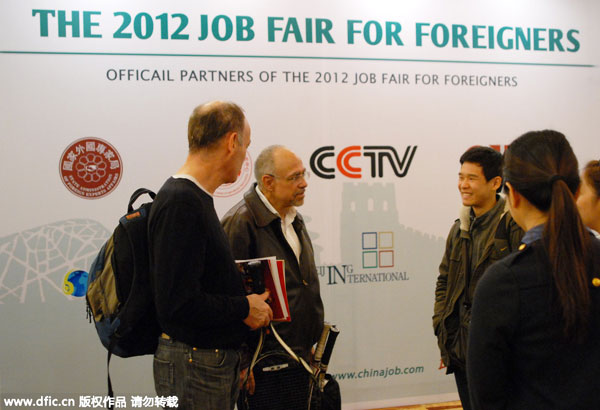 |
|
Foreign job hunters attend the 2012 Job Fair for Foreigners in Beijng, April 7, 2012. [Photo/IC] |
The general offices of the Communist Party of China Central Committee and the State Council on Thursday jointly issued guidelines on the management of foreigners' permanent residence in China.
The guidelines promote more flexible and pragmatic conditions for foreigners to apply for permanent residency in China, simplified application procedures and substantially improved services.
China's top leaders have stressed time and again the need to take more active measures to enhance the attractiveness of China to foreign talent. The guidelines promote comprehensive reform of the management of the permanent residence system for foreigners and higher quality services. The move not only shows China's growing confidence in its ability to attract foreign talent but also establish an important foundation for it to raise the international competitiveness of its talent system.
The document also marks a concrete step toward adapting to the increasing inflow of foreign talent to China. By the end of 2015, 5,208 senior overseas professionals had been introduced to China under the government's "1,000 Talents" Recruitment Program for global experts, which was launched in 2008. With the further rise of China's economic strength in recent years, an increasing number of international professionals have come to China in pursuit of their "Chinese dream". And a large number of high-tech parks have been built for various kinds of business start-ups and overseas talents.
According to an UN estimate, there were 848,500 foreign people residing in China by the end of 2013, an annual growth of 3.9 percent during the decade. A report published by the HSBC Group in October 2014 also indicated that China ranked the third in its attractiveness to foreign talents, behind Switzerland and Singapore. Due to its fast economic growth and relatively low living costs, China has becoming an increasingly attractive destination for foreigners to live and work. After the Ministry of Public Security expanded the range of work units for foreigners that could apply for permanent residency in June 2015, the latest move further eases the requirements for types of employer and job titles for permanent foreign residents and improves the quality of services provided to them.
The proposals also mark China's adoption of more innovative methods in terms of global talent recruitment. Compared with previous evaluations that were based largely on government-dominated talent recruitments projects, the latest document will take into consideration more market factors when reviewing foreign candidates applying for permanent residency, such as their salary, taxation and social credit.
But the new guidelines are not only aimed at attracting more foreign talent to China to make their contributions to China's development, they will also create better conditions for foreigners already residing in China to live and work in the country.
For example, measures will be introduced to make it more convenient for foreigners working in fields with strong government support to convert their working visa into permanent residency in China, and will also ease restrictions so outstanding overseas students can work in China and provide them with channels to apply for permanent residence. Once granted permanent residency, foreigners will enjoy equal treatment with Chinese citizens, for instance, in purchasing property.
China's deepening involvement in global affairs and its adoption of the Belt and Road Initiative, among other strategies, have increased its demand for international talent. The series of flexible and pragmatic measures embodied in the latest guidelines, which are to be followed with more detailed regulations, will facilitate foreigners becoming permanent residents in China and are expected to help promote the inflow of more overseas talent into China.
Wang Huiyao is director of the Center for China and Globalization, and Miao Lv is secretary-general of the center.

I’ve lived in China for quite a considerable time including my graduate school years, travelled and worked in a few cities and still choose my destination taking into consideration the density of smog or PM2.5 particulate matter in the region.